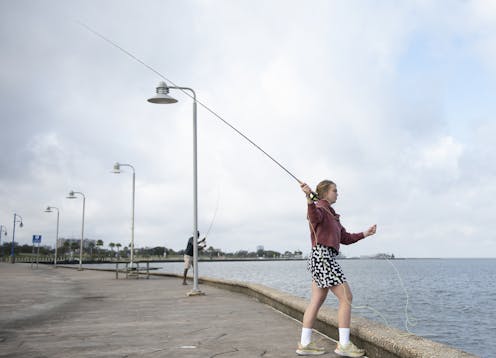Here's what happened when I taught a fly-fishing course in the waterways of New Orleans
- Written by Christopher Schaberg, Director of Public Scholarship, Arts & Sciences at Washington University in St. Louis

What does the course explore?
The course introduced the techniques of fly-fishing and explored what makes it different from other forms of fishing. We learned about different waters and fish species, and how fly-fishing can be used in a variety of conditions. We also discussed the literary[7] and philosophical[8] aspects of fly-fishing.
I framed the course as a “field experience,” and it took place entirely off campus and around our city instead. This ended up making the course surprisingly effective.
We first met in a field in City Park, where we had plenty of room to form a wide circle: Casting a fly line requires a lot of space. The students practiced casting toward the center of our circle; this way they could see each other’s forms improve, and I could move around the circle giving tips, advice and encouragement. We used pieces of yarn on the ends of the line to reduce the risk of inadvertent ear-piercings.
Beside this field was a pond. As the students got the basics of casting down, they could head to the shoreline and cast flies – with hooks – into the water. A few students even caught fish: beautiful little bluegills, sunfish and bass.
After a few days in City Park, we fly-fished along the cement-lined Bayou St. John in the heart of Mid-City. Another day we met at Lake Pontchartrain. We spread out to fish, minding the obstacles and obstructions posed by the urban infrastructure, and being careful when joggers or dog walkers passed by.
We gathered occasionally to discuss the theory and practice of fly-fishing. All the while, people would linger and watch with bemusement. It was rare to see fly-fishing in urban New Orleans.
Why is this course relevant now?
This course tuned students into our region, ecosystem and environment through a focused activity.
What’s a critical lesson from the course?
My students did not just develop an outdoor skill – they interacted with people in the community, blurring the boundaries between their college lives and the social fabric of the city.
What materials does the course feature?
On the first day, each student chose a fly-fishing book from a stack I brought, from the literary[9] and philosophical[10] to the more pragmatic[11] and instructional[12]. We started each morning by sharing insights and lessons we’d gleaned from our books. In the evenings, we wrote together on a Google Doc, creating a collaborative essay about the course.
I also used a series of online instructional videos on fly-fishing[13] created by outfitter Far Bank[14], which provided fly rods for my class at a discount that they offer to educators. I purchased the equipment with my professorship funds to spare my students extra expenses.
What will the course prepare students to do?
Studies have shown that fly-fishing can foster collective purpose[15] around environmental justice movements. Our course demonstrated how fly-fishing can also translate to public, urban contexts and facilitate positive everyday social interactions.
As my students gained confidence with their fly rods, they also welcomed the questions posed by onlookers who wondered what they were doing. My students would explain what the class was and what fly-fishing entailed. My students were engaging with the public about their college experience.
This past summer I transitioned to another institution, Washington University in St. Louis, where I’m directing a new Program in Public Scholarship[16]. I’m not currently teaching, but if I have the chance to propose a course, I’ve been eyeing the lagoons in bustling Forest Park, a short walk from campus – the perfect setting for a redux version of my fly-fishing course.
References
- ^ Uncommon Courses (theconversation.com)
- ^ a book on fly-fishing (www.dukeupress.edu)
- ^ OARS (www.oars.com)
- ^ how to cast a fly rod (www.pinterest.co.uk)
- ^ A River Runs Through It (www.imdb.com)
- ^ John Kelly (www.saatchiart.com)
- ^ literary (press.uchicago.edu)
- ^ philosophical (www.theparisreview.org)
- ^ literary (www.upress.virginia.edu)
- ^ philosophical (www.graywolfpress.org)
- ^ pragmatic (services.math.duke.edu)
- ^ instructional (www.patagonia.com)
- ^ online instructional videos on fly-fishing (farbank.com)
- ^ Far Bank (farbank.com)
- ^ fly-fishing can foster collective purpose (theconversation.com)
- ^ Program in Public Scholarship (publicscholarship.wustl.edu)
Authors: Christopher Schaberg, Director of Public Scholarship, Arts & Sciences at Washington University in St. Louis

